
Summer School 04.08.2025 – 08.08.2025
Personal Religion: Agency, Autonomy, and Individual Responsibility in the History and Practice of Religions
at the Paris-Lodron University of Salzburg
Leading scholars specializing in diverse religious traditions – including Judaism, Islam, Christianity, Buddhism, and Jainism – explore personal religion through a series of lectures. The program examines historical and contemporary expressions of individual faith and spirituality, including practices and spaces. Students will present their research and engage in in-depth discussions. A cultural program complements the academic sessions.
Program
Monday 04.08.2025
09:00 Arrival 10:30 Registration Welcome and Introduction in HS 103 by Martin Rötting: Personal Religion: Agency, Autonomy; and Individual Responisbility
Lecture 1: Prof. Samsul Maarif: Dancing the Religious -Dialogical Person
Response 1: Ananda Mishra
12:00 Lunch
14:00 Lecture 2: Ven. Chongdok C.H Park, Donkung University, Korea. Young Adult Buddhism in the 21st Century
Response 2 Martin Rötting
15:30 Group Work 1 Religion & Biography
17:00 Debate Moderation Prof. Martin Rötting
19:30 Student party (inside-hall of the Faculty)
Tuesday 05.08.2025
09:00 Lecture 3: Prof. Martin Rötting: The Empirical Grammar of Perosnal Hope. Case Studies in South Korea and Austria
Response 3
10:30 Lecture 4: Prof. Wamae W. Muriuki: Spiritual and/or Religious? Kenian Youth, Online Spaces and Conversations about Religion
Response 4: Grace Darling
12:00 Lunch
14:30 Lecture 5: Prof. Dr. Edith Kayeli Chamwama: Faith and Freedom: The impact of African Cultural and Socio-Political Landscapes on Religious Autonomy HS 101 in cooperation with Salzburger Hochschulwochen 2025
Response 5 Emma Abate
15:30 Group Work 2 Personal Religion & Society
19:30 Concert
Wednesday 06.08.2024
09:00 Student Papers I (20/10)
10:30 Student Papers II Prof. Yossi Chajes: Judaism and Personal Religion
12:00 Lunch
14:00 Cultural Outing Mozarts Religion
19:30 Award Ceremony (in German) or free evening
Thursday 07.08.2025
09:00 Lecture 6: Prof. Emma Abate: Jewish-Christian Syncretism in Magic and Art. Renaissance to Modernity
Response 6 Prof. Yossi Chajes
10:30 Lecture 7: Prof. Ananda Mishra and Grace Darling: Agency, Autonomy, and Individual Responsibility in Theism with special refernce to Hindu Religious Text Śrimadbhagavadgītā
Response 7 Wamae W. Muriuki
12:00 Lunch
14:00 Workshop: Cross-Cultural qualitative Analysis of Individual Religion
15:30 Ulrich-Winkler Award (in German)
19:30 Reception (Bischofsresidenz)
08.08.2025 Friday
09:00 Group Work presenations
10:30 Reflections & closure and farwell
More information about the lectures:
Introduction to Personal Religion: Agency, Autonomy, and Individual Responisbility
Lecture 1: Prof. Samsul Maarif: Dancing the Religious -Dialogical Person
Lecure 2: Young adult Buddhism in the 21st century Korea. Prof. Soonil Hwang, Ven. Chongdok C.H. Park, Dongguk University, South KoreaThe South Korean birth rate has dropped by over half since the 1990s and, if current trends continue, the nation’s population will begin contracting by 2035. Meanwhile, South Korean society has grown increasingly materialistic and secular. As of the nation’s 2015 census, only 15.5% of the country described themselves as Buddhist, compared with 22.8% a decade earlier, while 56% of all South Koreans and 65% of young adults claim no religious affiliation at all. Korean Buddhism is not alone in this crisis, however, as dropping birthrates and aging populations are adversely affecting the recruitment of Catholic clergy, not only in Korea, but around the globe. The Jogye Order, the biggest Buddhist Order in Korea, is clearly struggling to remain relevant in contemporary Korean society, especially among the younger generations, and unless the Korean Jogye Buddhist Order reverses these trends, the order faces the real possibility of extinction.Over the last three decades, the Korean Jogye Order’s postulant education system has made considerable progress in standardizing, centralizing, and modernizing Buddhist education for aspiring monastics. As celebrated by the order’s 2022 publication “The 30-year History of Buddhist Monastic Postulant Education”, the order’s program has successfully seen over 9800 ordained novices graduate since its launch in 1991. However, there is a broad consensus within Korea’s Buddhist community that the religion is in crisis and, within the order, in particular, that its future is in peril. Unless it is reversed, the trend portends the very real possibility of the order’s demise by the end of the 21st century, if not sooner. The order recently vowed to reverse the downward trend in monastic recruitment and raise the annual number of ordained novices to 150 by 2025 through a multifaceted plan involving greater youth outreach efforts, an increased social media presence, and online Buddhist educational materials, along with an expansion of the order’s international missionary efforts. Given that postulant recruitment is critical to the order’s survival, this lecture examines Young adult Buddhism in Korea and the Jogye Buddhist Order’s postulant education system in light of the current membership crisis.
Lecture 3: The Empirical Grammar of Personal Hope. Case Studies in South Korea and Austria. Prof. Martin Rötting, University of Salzburg There is passive and active hope. One aspect of hope also refers to a situation that is not in one’s own hands, a “paradise prepared for us”. Another aspect refers to a part that one must contribute to oneself. This also applies to concrete hopes, as in the case of climate change. We know that everyone has to participate, including us. But if only I participate, it is “irrelevant”. What is important here is the idea of critical mass, according to which a certain percentage (10%) of the population is enough to “get the ball rolling”. Prophetic figures of hope can be effective because the “critical mass” can be reached. Greta Tunberg and the Fridays for Future can be seen as an example. An important aspect for the motivating life force, according to the hypothesis of this paper, is the concrete utopia (Ernst Bloch), a possibility to help bring about this “critical mass” in order to make decisive visions of hope a reality. The paper investigates empirical shapes of hope in Austria and South Korea and asks questions of cultural sharpening of religious forms of hope.
Remarks on: Rural Buddhist in contemporary Indonesia: toward a study on the history of religious practice and agency. Dr. Yulianti, History Department Faculty of Cultural Sciences and Center for Religious and Cross-cultural Studies, University of Gagjah Mada, Indonesia.
This is a preliminary study about the history of practice of Buddhism among the Javanese Buddhist in rural area of central Java Indonesia. The study is placed in the debate of issue of religious revivalism, new practices and agencies of Buddhism in contemporary Indonesia. This lecture attempts to bring the Buddhist living in rural area as important agent in the practice of Buddhism in Indonesia and became central in the aspect of inventing new kind of practice which are aligned to their cultural roots and tradition. The peasantry life of Buddhist living in rural areas also gives more nuance on how rural Buddhist connect to a larger issue such as environmental issue. Meanwhile, their pivotal agency is evidenced with the creation of new religious practice and ritual to align with their living environment.
Lecture 4: Spiritual and/or Religious? Kenyan Youth, Online Spaces, and Conversations about Religion. Prof. Dr. Wamae W. Muriuki, University of NairobiIn the past decade or so, many Kenyan youth are taking advantage of social media to encounter, discuss, and experiment with various modes of spiritual expression. Whatsapp groups, in particular, have become safe spaces for the free exchange of ideas and techniques that young people can freely incorporate into new forms of private practice. Set against the backdrop of a majority Christian and religiously conservative society, this presentation will explore the ways in which this mediated space encourages new forms of religious practice, expression, and experimentation over and against cultural norms.
Lecture 5: Faith and Freedom: The Impact of African Cultural and Socio-Political Landscapes on Religious Autonomy. Prof. Dr. Edith Kayeli Chamwama, University of NairobiThe phrase “The African is notoriously religious” (Mbiti 1969: 1) expresses how religious practices and beliefs are entrenched in cultural heritage, historical experiences, and social-political organizations. While these forces have given rise to rich and divergent religious expressions, they usually limit individual autonomy in religious choices. Communal attitudes may often require fidelity to traditional beliefs, yet colonial histories and contemporary political regimes have added new power dynamics to religious practice. Despite the current individual expression of globalization and urbanization, many African communities struggle with the dichotomy between social expectations and personal action in religious beliefs and practices. Furthermore, socio-political upheavals, government involvement in religious issues, and justice systems based on traditional or colonial structures all hinder the practice of religious freedom.Autonomy is defined by individuals‘ ability to make independent decisions about their religious and spiritual beliefs and practices. However, in the African setting, this autonomy is usually affected by a complex interplay of cultural, historical, and sociopolitical forces. Furthermore, modern influences such as globalization, urbanization, and digital technology have promoted individuality, undermining old communal frameworks. However, these factors intersect with long-standing cultural norms and political realities, causing problems for those wanting to demonstrate their religious autonomy. This study investigates how cultural traditions, historical legacies, and sociopolitical realities in Africa impact, hinder or enable individual religious organizations. It tries to understand how Africans negotiate these dynamics to exercise personal choice in their religious beliefs and practices in the face of greater societal forces.Key Words: African, Cultural heritage, historical experiences, Social-political organizations.
Lecture 6: Jewish-Christian Syncretism in Magic and Art: Renaissance to Modernity. Prof. Emma Abate, University of Bologna, ItalyThis lecture explores the dynamic interplay between Jewish and Christian traditions in magic and art from the Renaissance to modernity. During the Renaissance, the resurgence of esotericism, Hermeticism, and Kabbalah created fertile ground for syncretism, where Jewish mystical concepts were reinterpreted within Christian frameworks. Figures like Giovanni Pico della Mirandola, Marsilio Ficino and Egidio da Viterbo absorbed Kabbalistic elements, blending them with Neoplatonism, Orphism and aspects of medieval spirituality like Gioacchino da Fiore and Ramon Lull, to construct new intellectual syntheses. Such exchanges raised critical questions about cultural and religious agencies, as well as tensions between appropriation and reverence. The lecture will examine pivotal individuals who navigated these overlapping spheres, including Christian Hebraists, messianic figures, kabbalists and conversos (Jewish converts to Christianity). They exemplified personal autonomy while grappling with collective responsibility—balancing innovation with fidelity to tradition. Art also served as a medium for syncretic expression, where esoteric symbols, including the Hebrew alphabet, sefirotic diagrams, the Temple vessels, and Christian iconography, intertwined. Artists such as Albrecht Dürer, and later William Blake embedded mystical and spiritual knowledge into visual culture, reflecting individual agency in exploring cross-religious themes. In the contemporary world, painters like Anselm Kiefer and Alberto Abate renovate this tradition, incorporating Kabbalistic and Christian motifs to examine the search for transcendence and interfaith spiritual synthesis. By tracing these developments, the lecture highlights how Jewish-Christian syncretism in magic and art allowed individuals to assert autonomy and creativity while engaging with the weight of religious responsibility. This investigation invites reflection on the complexities of interfaith exchange and the enduring role of individual agency in shaping the evolution of religious traditions.
Remarks on: Jewish Practice in the Private Sphere: Reflections on Judaism at Home by Prof. Dr. J. H. Chajes, University of Haifa
Much of the scholarly literature on Judaism has focused on its public dimensions—Temple, synagogue, community—often leaving the private sphere under-explored or taken for granted. In this talk, I offer some personal-anthropological reflections on what it means to think seriously about the home as a site of religious life. I’ll consider how everyday practices—sanctifying time through candle-lighting, marking space with a mezuzah, navigating the embodied discipline of family purity, observing mourning rites, keeping kosher, feasting, fasting, and studying Torah—anchor Jewish existence in the rhythms of daily life. These aren’t merely ancillary to public ritual; they are constitutive of how Judaism is lived, transmitted, and sustained. Rethinking the domestic sphere in this way allows us to attend to the textures of religious life that often escape notice, even as they shape Jewish identity in enduring ways.
Lecture 7: Agency, Autonomy and Individual Responsibility in Theism with special reference to the Hindu Religious Text Śrimadbhagavadgītā. Prof. Ananda Mishra and Prof. Grace Darling Department of Philosophy & Religion, Banaras Hindu University, IndiaThe idea of God and the Free-will is logically incompatible according to Benedictus de Spinoza (1632-1677) whereas Immanuel Kant (1724-1804) does not find them incompatible. God in Spinoza is impersonal though determinism is complete. This ‘divine determinism’ will be an ideal position for any theologist belonging to the theistic religions who believe in Personal God. And here lies the significance of the ancient religious text Śrimadbhagavadgītā (Gītā). Gītā presents a fully deterministic world-view where everything is controlled, regulated and pre-determined by the Omniscient, Omnipresent and all-good God. In this world which is completely determined and regulated by the Almighty God there is full autonomy of the self and total freedom of the agent according to Gītā. God here is personal and ‘divine determinism’ is also total. How autonomy and free agency is possible in a completely God-regulated world has been a perplexing problem for the world religions and their theologists. The resolution of this problem by Gītā is its unique gift to them. As Gītā addresses this issue in a philosophical and rational way the treatment of the problem and the solutions offered may be utilized by other world religions and their theologists.
Speakers:
Prof. Martin Rötting
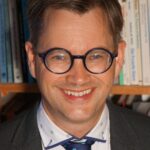
Associate Professor of Religious Studies and Head of the Religious Studies programme at the Center for Intercultural Theology and Study of Religions at Paris-Lodron University, Salzburg.Education:
- 1990-1994. Studies in Religious Education at Catholic University Eichstätt
- 1999-2001. Studies in ecumenism at Trinity College Dublin, MA of Ecumenic Studies
- 2002-2007. Doctorate (Dr. phil.) in Religious Studies at the Ludwig- Maximilians-University Munich
- 2013-2018. Habilitation in Religious Studies at the LMU Munich
- 2019- Professor of Religious Studies at the Univeristy of Salzburg
Dr. D.Phil Soonil Hwang

Associate Professor in the College of Buddhist Studies and also Dean of the College of Buddhism in Dongguk University in Seoul, South Korea. His main field of research is the doctrinal history of Early Buddhism and Buddhist culture in South and Southeast Asia. Courses: Early & sectarian Buddhism
- 1985-1987 Hekwang High School, Pusan
- 1987-1993 Dept. of Indian Philosophy, Dongguk Univ. Seoul
- 1993 B.A. in Indian Philosophy1993-1995 Graduate School, Dept. of Indian Philosophy, Dongguk Univ. Seoul
- 1995 M.A. in Early Indian Buddhism
- 1996-2002 Dept. of Oriental Studies, Oxford University
- 2003 D.Phil. Oxford University
Ven. Chongdok C.H. Park
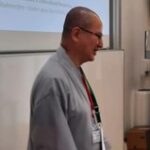
Ven. Chongdok 正德 (PARK Cheonghwan 朴淸渙) is Professor of the College of Buddhist Studies and Director of Buddhist Culture Research Institute at Dongguk University in Seoul, Korea. He received his DPhil degree in Buddhist Studies at the University of Oxford in 2005 based on his dissertation entitled, A Translation and Study of Selected Avadānas of the Mūlasarvāstivādin Vinaya (MSV). His main research interest is the Buddhist narratives. Recently, he is also doing research on the contemporary Korean Buddhism. A Study on the Narrative of Apalāla in the Mūlasarvāstivādavinaya Bhaiṣajyavastu (2014). Some Contemporary Dilemmas of Korean Buddhism: A Critical Review of the Jogye Order’s 2018 Periodic Report, Religions 10(4), (2019), (A&HCI journal). A survey of the attitudes concerning the role of the laity in Korea’s Jogye Order, Religions 10(12), (2019), (A&HCI journal).
He also worked as an editorial consultant of the Collected Works of Korean Buddhism by the Jogye Order of Korean Buddhism.
Prof. Dr. Ananda Mishra

Ananda Mishra, a Ph.D in Philosophy, from Banaras Hindu University, presently works as a Senior Professor at the Department of Philosophy and Religion, Banaras Hindu University, Varanasi. Before that Prof. Mishra has taught at Mahatma Gandhi Kashi Vidyapeeth, Varanasi. Prof. Mishra has to his credit more than fifty publications. His publications are mainly on Advaita Vedānta, Mahāyāna Buddhism, Kāśmīra Śaivism, Indian Epistemology, Phenomenology and Existentialism. Formerly Head at the Department of Philosophy and Religion, B.H.U. Prof. Mishra has been a General Fellow of ICPR. Prof. Mishra was the editor of the journals Dārśanika Traimāsika, Dārśinikī and Ānvīkṣikī. He is presently Joint Secretary of Indian Philosophical Congress.
Prof. Dr. Grace Darling
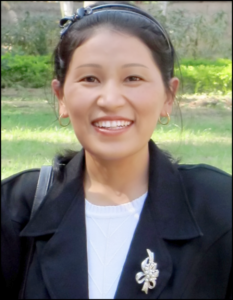
Associate Professor, Department of Philosophy & Religion, Banaras Hindu University,MA in Philosophy from North-Eastern Hill University, Shillong (NEHU), M.Phil in Philosophy from North-Eastern Hill University, Shillong, Topic of Dissertation: Ludwig Feuerbach on Religion: A Critique. Ph.D in Philosophy from North-Eastern Hill University, Shillong, Topic: Zeliangrong Culture and Religion: A Philosophical Study, Post-Doc Research Exposure from University of North Texas (UNT), USA. Area of Research: Environmental Philosophy
Prof. Dr. J.H. (Yossi) Chajes

Foto: Private
J. H. (Yossi) Chajes (Ph.D., Yale University 1999) is the Sir Isaac Wolfson Professor of Jewish Thought at the University of Haifa. Chajes’s research focuses on the intersection of Kabbalah, magic, and science in Jewish cultural history. He has written on spirit possession and exorcism, egodocuments, women’s religiosity, Jewish attitudes towards magic, and the visualization of knowledge. Chajes’s first book, Between Worlds: Dybbuks, Exorcists, and Early Modern Judaism (2003) was listed by the Wall Street Journal as among the top five books ever written on spirit possession, alongside Aldous Huxley’s The Devils of Loudun. His recently published The Kabbalistic Tree was awarded the 2023 Jordan Schnitzer Book Award for best book in the category of philosophy and Jewish thought; Library Journal lauded it as “a monumental achievement that will be valuable to scholars and general readers interested in Judaism, religion, and art history.” Chajes’s pioneering work has been awarded five Israel Science Foundation (ISF) grants, the Friedenberg Prize for the outstanding project in the humanities, and two Volkswagen Foundation grants to develop the digital humanities project “Maps of God – The Visual Kabbalah Portal (ilanot.org).”
Dr. Wamae Muriuki
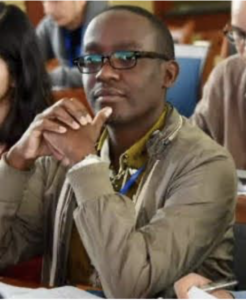
Foto: Private
Dr. Wamae Muriuki is a lecturer in the Department of Philosphy and Religious Studies. He graduated with a PhD in Comparative Studies of Religion from the Ohio State University in 2012.His area of specialization is in Japanese Buddhism, particularly Japanese True Pure Land Buddhism, or Jodo Shinshu, on which he wrote his PhD dissertation.At the University of Nairobi, he teaches courses on Comparative Religion, Interfaith Relations, and specialised courses on Hindu and Buddhist thought. His current research interests focus on Kenyan converts to Hinduism and Buddhism, and their contested relationship to the dominant religious paradigm.
Prof. Emma Abate
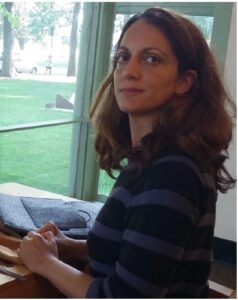
Associate Professor at Bologna University. She teaches «Jewish Culture» and «History of the Hebrew Book». Her work is dedicated to the exploration of the Jewish magical and kabbalistic tradition and its reflections within Christian Kabbalah, through the material, philological and artistic analysis of manuscripts and artifacts from the Middle Ages to Modern times.At the Institut de recherche et d’histoire des textes (IRHT-CNRS) in Paris, she is the PI of the team project BiNaH: Bibliothèque nationale „Hebraica“, Hebrew Manuscripts in Paris. She is also the scientific coordinator of the team project Books within Books: Hebrew Fragments in European Libraries.
In Kooperation with: ![]()
Prof. Dr. Edith Kayeli Chamwama
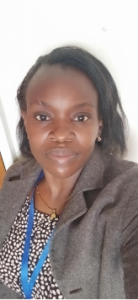
Edith Kayeli Chamwamas specialty is in African Religion and African Christianity. She is a member of various professional bodies that include the The Circle of Concerned African Women Theologians (CCAWT), African Association of the Study of Religion (AASR).She is involved in various research projects that contribute to her academic work and growth. Her research interests are in African Religion and its intersection with the contemporary Issues affecting the people of Africa ranging from Christianity, Ecology, Development and Health among other issues.Education: Assistant Director in charge of Publications at the Maryknoll Institute of African Studies 2014 started working at University of Nairobi
Dr. Yulianti
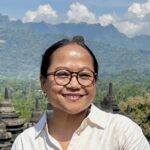
Yulianti is a faculty member at the History Department Faculty of Cultural Sciences and Center for Religious and Cross-cultural Studies (CRCS) Universitas Gadjah Mada. She has done research on the history of Buddhism in modern Indonesia mainly looking at Buddhist transnational networks and agencies (1900-1959). It focuses on analyzing the role of Chinese descendants and various networks in the making of Buddhism in the late colonial Indonesia and early independence. The manuscript has recently been published by Leiden University Press (2024). Her works is among the few that brings Indonesia into perspective in the historiography of Buddhism in Southeast Asia. Her research interest includes Colonialism and Religion in Indonesia, Maritime Buddhism in Southeast Asia, and Religious Heritage and Material Culture Studies. Currently, she also develops interest in religion during the Cold War period in Southeast Asia, particularly Indonesia.
Dr. Samsul Maarif
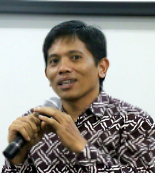
Head of the MA program of the Center for Religious and Cross-cultural Studies (CRCS), Graduate School, Universitas Gadjah Mada. His research interests include religions of indigenous people, ecology, community development and advocacy. His latest research projects included: “Religious Perceptions on Environment in Indonesia”, “Documentary Films on Indonesian Pluralities”, and “Shifting Trends and Patterns Shaping the Environment for Tolerance and Radicalization”
Education:1995-1999. Institut Agama Islam Negeri (IAIN/ The State Institute for Islamic Studies) Alauddin, Makassar, Indonesia. S1 in Islamic Theology and Philosophy.2001-2003. Gadjah Mada University Jogjakarta, Indonesia. M.A in Religious and Cross-cultural Studies.2004-2005. Florida International University, Miami, Florida. AS. MA in Religious Studies.2006-2012. Arizona State University, Temple, Arizona. AS. Ph.D. in Religious Studies.
Conditions for attending our Summer School:
For the SummerSchool attendants you need to register
- For Salzburg University Students: Course – Registration
- SummerSchool 2025 external Students: Registration
- Download Summer School Crossculture Program 2025
- For the Salzburger Hochschulwochen, in which this SummerSchool is a part of, for housing, meals, cultural program and the program of the Salzburger Hochschulwochen REGISTER here: Salzburger Hochschulwoche 2025 | Allgemeine Anmeldung
- for people under 30 REGISTER here: https://www.salzburger-hochschulwochen.at/2025/anmeldung-studierend. First registration of the SummerSchool will be served first
Important notes:
- ROOM: If you have a private room in Salzburg and do not need to book a room, book the „Wochenkarte“ only.
- HELP & Information:
- LANGUAGES:The SummerSchool is in English, the Hochschulwochen will be in German. There will be English translation for all participants of the SummerSchool.
Direction to the University of Salzburg?
Arrival at Salzburg main station: Take trolleybus line 1 to the stop “Herbert-von-Karajan-Platz“. ⇒ On Herbert-von-Karajan-Platz turn northeast towards Universitätsplatz. ⇒ Turn right onto Universitätsplatz– the university is on the right hand side.
Arrival Salzburg Airport ⇒ Take trolleybus line 10 to the stop “Herbert von Karajan-Platz”. ⇒ On Herbert-von-Karajan-Platz turn northeast towards Universitätsplatz. ⇒Turn right onto Universitätsplatz – the university is on the right hand side.
Apply for a student paper:
All students are allowed to hand in papers. The papers have to focus on problems of crosscultural relations and give a concrete field example. This can include academical, methodical, hermeneutical, philosophical, theological, or other relevant perspectives. Please send an abstract with 150 words to Prof. Martin Rötting () till 15.07.2025.
Criteria to receive 3 ECTS:
In order to get 3 ECTS points you need to attend all lectures of the SummerSchool program, give a paper in the presentation slot and hand it in as an academic paper (10 pages, 12 New Times Roman, 1,5 space) to Prof. Martin Rötting ().
Contact and information:





